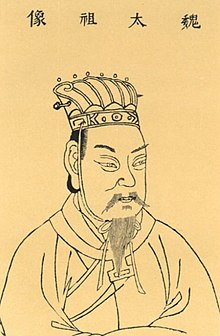Cao Cao
| Cao Cao 曹操 |
|||||||||||||
|---|---|---|---|---|---|---|---|---|---|---|---|---|---|

A Ming dynasty block print portrait of Cao Cao from Sancai Tuhui.
|
|||||||||||||
| King of Wei | |||||||||||||
| Tenure | 216 – 15 March 220 | ||||||||||||
| Successor | Cao Pi | ||||||||||||
| Imperial Chancellor of the Han dynasty | |||||||||||||
| Regency | 208 – 15 March 220 | ||||||||||||
| Successor | Cao Pi | ||||||||||||
| Monarch | Emperor Xian of Han | ||||||||||||
| Born | 155 Bozhou, Anhui, China |
||||||||||||
| Died | 15 March 220 (aged 65) Luoyang, Henan, China |
||||||||||||
| Burial | Cao Cao Mausoleum | ||||||||||||
| Spouse |
|
||||||||||||
| Issue (among others) |
|||||||||||||
|
|||||||||||||
| Father | Cao Song | ||||||||||||
| Full name | |
|---|---|
|
Family name: Cao (曹) Given name: Cao (操) Courtesy name: Mengde (孟德) Nicknames: Jili (吉利), Aman (阿瞞) |
|
| Posthumous name | |
|
|
| Temple name | |
| Taizu (太祖) |
| Cao Cao | |||||||||||||||||||||||||||||||

"Cao Cao" in Chinese characters
|
|||||||||||||||||||||||||||||||
| Chinese | 曹操 | ||||||||||||||||||||||||||||||
|---|---|---|---|---|---|---|---|---|---|---|---|---|---|---|---|---|---|---|---|---|---|---|---|---|---|---|---|---|---|---|---|
|
|||||||||||||||||||||||||||||||
| Transcriptions | |
|---|---|
| Standard Mandarin | |
| Hanyu Pinyin | Cáo Cāo |
| Wade–Giles | Ts'ao2 Ts'ao1 |
| IPA | [tsʰǎu̯ tsʰáu̯] |
| Yue: Cantonese | |
| Yale Romanization | Chòuh Chōu |
| Jyutping | Cou4 Cou1 |
| Southern Min | |
| Hokkien POJ | Chô Chhò |
| Tâi-lô | Tsô Tshau |
| Middle Chinese | |
| Middle Chinese | Dzaw Tsʰaw |
| Old Chinese | |
| Baxter-Sagart | *N-tsˤu tsʰˤaw |
Cao Cao ([tsʰǎu̯ tsʰáu̯]; Chinese: 曹操; 155 – 15 March 220),courtesy name Mengde, was a Chinese warlord and the penultimate Chancellor of the Eastern Han dynasty who rose to great power in the final years of the dynasty. As one of the central figures of the Three Kingdoms period, he laid the foundations for what was to become the state of Cao Wei and was posthumously honoured as "Emperor Wu of Wei". Although he is often portrayed as a cruel and merciless tyrant in subsequent literature, Cao Cao has also been praised as a brilliant ruler and military genius who treated his subordinates like his family. During the fall of the Eastern Han dynasty, Cao Cao was able to secure the most populated and prosperous cities of the central plains and northern China. Cao had much success as the Han chancellor, but his handling of the Han emperor Liu Xie was heavily criticized and resulted in a continued and then escalated civil war. Opposition directly gathered around warlords Liu Bei and Sun Quan, whom Cao was unable to quell. Cao was also skilled in poetry and martial arts and wrote many war journals.
Cao Cao was born in Qiao (present-day Bozhou, Anhui) in 155. His father Cao Song was a foster son of Cao Teng, who in turn was one of the favourite eunuchs of Emperor Huan. Some historical records, including the Biography of Cao Man, claim that Cao Song's original family name was Xiahou.
...
Wikipedia
